NAM Launches Campaign to Prevent Tax Increases on Manufacturers

The NAM today launched an industry-wide campaign to educate legislators, candidates and the Biden administration on the urgent need for action to preserve pro-growth tax policies scheduled to expire at the end of next year.
What’s going on: Critical reforms from the 2017 Tax Cuts and Jobs Act will expire at the end of 2025. The NAM’s Manufacturing Wins campaign is designed to ensure that Congress preserves 2017 tax reform in its entirety to avoid significant economic damage in the manufacturing sector and across the broader economy.
What’s at stake: If they do not, at the end of 2025, virtually all manufacturers will face devastating tax increases that will cost manufacturing jobs, stifle growth and stunt innovation. Small manufacturers, which are often organized as pass-through businesses that pay tax at the individual tax rates, face increases in their income taxes and a loss of tax reform’s 20% pass-through deduction.
- Family-owned manufacturers will experience changes to the estate tax that subject more of their assets to taxation upon the death of a loved one.
- Investments in manufacturing growth will continue to be delayed without action to restore immediate R&D expensing, accelerated depreciation for capital equipment purchases and a pro-growth interest deductibility standard.
Learn more: What’s at Stake: Manufacturers Face Devastating Tax Increases in 2025 explores the tax provisions up for debate next year—and highlights the NAM’s policy suggestions for Congress to prevent devastating tax hikes.
Manufacturers at risk: A recent NAM survey found that if Congress fails to prevent the 2025 expirations, 73% of manufacturers would be forced to limit their capital investments, 65% would have to reduce job creation and 52% would spend less on R&D. Further, 93% of pass-through manufacturers said that the loss of the pass-through deduction would harm their ability to grow, create jobs and invest in their business.
- Some 94% of manufacturers believe Congress should act before the end of 2025 to prevent these tax increases.
The last word: “Manufacturers across the country promised to take tax reform’s pro-growth provisions and ensure they had a direct positive impact on American lives,” said NAM Small and Medium Manufacturers Group Chair Courtney Silver, president and owner of precision machining company Ketchie.
- Silver has made the case repeatedly that these tax priorities are critical for the success of small and medium-sized manufacturers in the United States.
- “We kept our promises. We created jobs, we purchased equipment and we gave back to our communities. I urge Congress to build on the promise of tax reform to enable manufacturers to do even more.”
PA Manufacturer: Preserve “Keystone” Tax Provisions
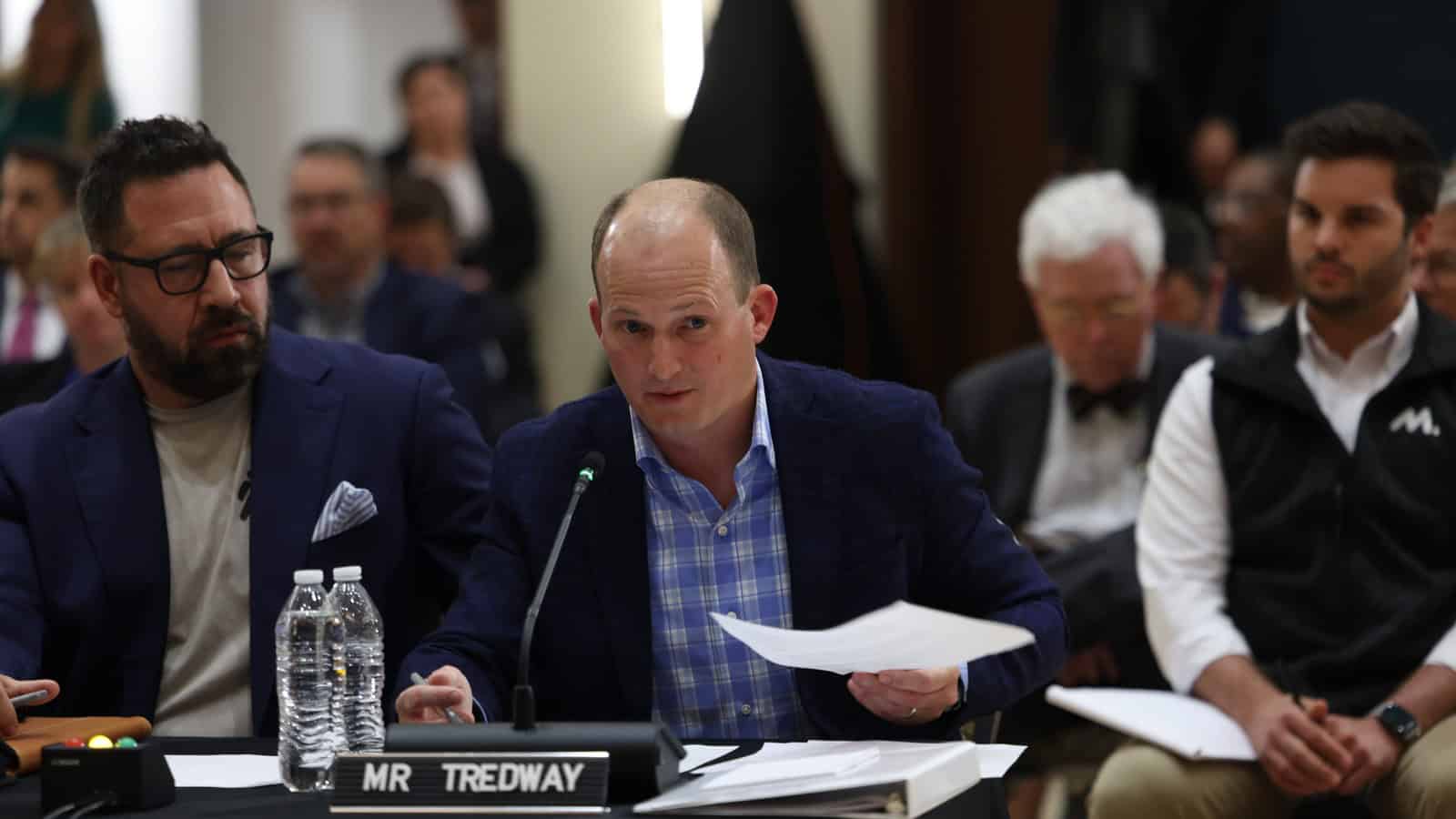
The U.S. tax code is a keystone of our nation’s economic competitiveness, Erie Molded Packaging President Tom Tredway told the House Ways and Means Tax Subcommittee at a field hearing on Monday. But pro-growth tax provisions have begun expiring, with more tax increases on the way next year—so that keystone has started to crack, “weakening the entire structure” of the country.
What’s going on: Tredway gave testimony at a hearing in his hometown of Erie, Pennsylvania, the namesake of his 42-year-old, family-owned custom injection molded parts and packaging solutions company.
- Tredway told Ways and Means Committee Chairman Jason Smith (R-MO), Tax Subcommittee Chairman Mike Kelly (R-PA) and others of the negative effects his business has seen since the expiration of three provisions from the 2017 Tax Cuts and Jobs Act: immediate expensing for domestic research and development, enhanced interest deductibility and full expensing.
- And Tredway put the committee on alert: additional TCJA expirations are scheduled for the end of 2025, and small manufacturers “will be disproportionately harmed” by congressional inaction to preserve these vital policies.
A winning formula: The expired provisions—as well as other, soon-to-expire measures—were like rocket fuel for manufacturers and the rest of the economy.
- “In the years following TCJA, Erie Molded was able to invest nearly $7 million in new capital equipment purchases thanks to full expensing,” Tredway said. “Along with this much-needed equipment, we were able to create new positions across our team, and we were able to deliver higher quality products faster to our customers.”
But now… Tredway’s company has had to delay important equipment purchases, and last year, its taxable income “was almost six figures higher” than Tredway had anticipated.
- What’s more, when the 20% pass-through deduction—currently taken by companies in which profits pass through to the owner and are thus taxed at the individual rate—expires at the end of 2025, Erie Molded Packaging will see another tax hike it can ill afford, “severely hampering [the company’s] growth trajectory.”
What should be done: Congress must pass the Tax Relief for American Families and Workers Act as soon as possible—and act to prevent tax hikes in 2025, Tredway told those at the hearing.
- “I urge every member of this committee to preserve these and the other pro-growth provisions, which allow manufacturers to function as the backbone of our economy and compete on a global scale.”
NAM, State Partners Call for Immediate Senate Action on Tax Bill
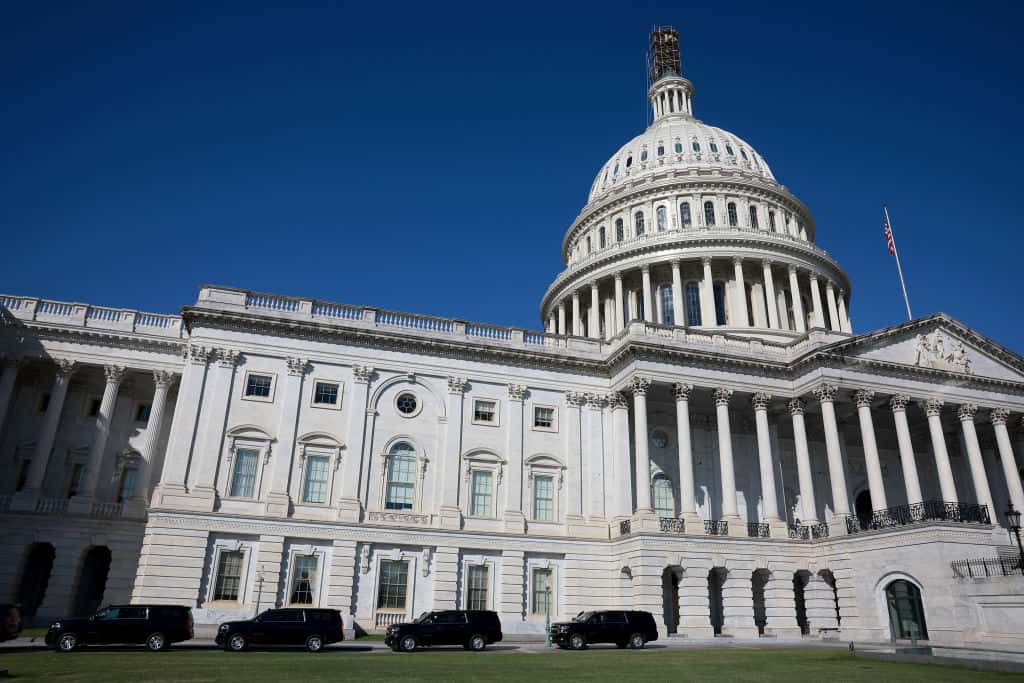
The Senate should immediately pass the Tax Relief for American Families and Workers Act, the NAM and its state partners told congressional leaders this week.
What’s going on: The NAM—along with 47 state manufacturing associations—on Monday continued its longtime, ongoing advocacy for the tax bill, which would restore three sector-crucial tax provisions: immediate expensing for domestic research and development expenses, enhanced interest deductibility on business loans and 100% accelerated depreciation for capital investments.
- “This critical legislation will support the ability of manufacturers in America to create jobs, invest in our businesses, give back to our communities and effectively compete in the global economy,” the groups said.
Why it’s important: If Congress fails to restore these key tax provisions, America’s competitiveness on the world stage will be under threat, they continued.
- “Without tax policies that encourage R&D and capital investment, countries with more favorable tax systems are capturing job-creating manufacturing investments.”
- China, for example, provides a 200% “super deduction” for companies’ R&D expenses, which is 10 times more than the U.S. gives. In 2022, the first full year following the expiration of immediate R&D expensing in the U.S., China’s R&D growth was three times that of the U.S.
What’s next: The Senate must not delay, the associations said. Congress must pass the Tax Relief for American Families and Workers Act—now.
The last word: “The breadth and depth of support for these critical, pro-growth tax provisions throughout the manufacturing industry shows the importance of immediate congressional action,” said NAM Vice President of Domestic Policy Charles Crain. “With additional damaging tax increases scheduled for next year, manufacturers cannot afford further delays.”
Manufacturers Participate in Small Business Week Capitol Hill Showcase
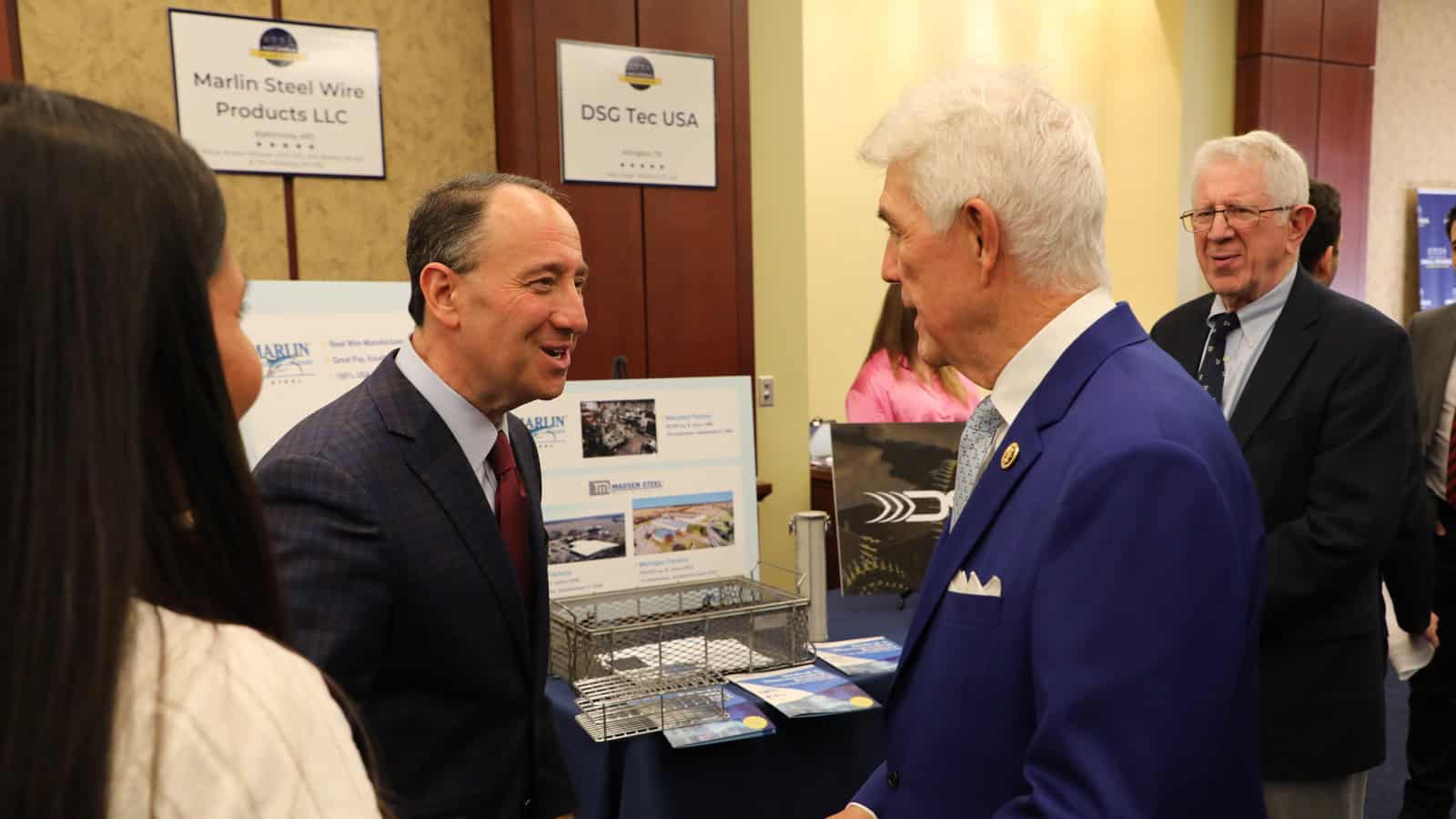
Manufacturers were among the select businesses invited to participate in last Wednesday’s Small Business Week showcase on Capitol Hill, and two in particular—Marlin Steel in Baltimore and its affiliated entity, Madsen Steel Wire Products, in Michigan and Indiana—made use of the time with lawmakers to advocate for some manufacturing-critical priorities.
What’s going on: Republicans on the House Small Business Committee hosted the event to shine a spotlight on the work of job creators throughout the country and draw attention to the federal government’s costly regulatory onslaught (Washington Examiner).
- Marlin Steel and Madsen Steel President and Owner and NAM board member Drew Greenblatt manned a booth with his family at the showcase displaying several products—such as metal baskets and racks—manufactured at his family-owned custom wire and steel products businesses.
- Greenblatt and others invited to the event had the opportunity to meet and speak with House Republican leaders, including Speaker Mike Johnson (R-LA), Majority Whip Tom Emmer (R-MN), Small Business Committee Chairman Roger Williams (R-TX) and Rep. Tim Walberg (R-MI).
The background: Marlin Steel, Madsen Steel and many other manufacturers thrived under a pro-growth tax provision in the Tax Cuts and Jobs Act of 2017 that allowed businesses to deduct 100% of their R&D costs in the year the costs were incurred.
- But in 2022 and 2023, that policy and two others—enhanced interest deductibility and 100% accelerated depreciation—expired.
- Ever since, manufacturers’ tax bills have increased, as companies, including Marlin Steel, have been required to amortize their R&D costs over five years, making innovation-crucial investments much more costly.
- “We want to grow jobs in our Indiana and Michigan factories, but we also need to give our talent the extraordinary tools needed to compete with China,” Greenblatt said. “We need immediate expensing to cover these huge investments. We put in $5 million but now have to pause investment. We need Congress and the president to act to allow us to hire more factory workers faster.”
Why it’s important: The showcase gave Greenblatt an opportunity to hammer home to lawmakers the importance to manufacturing of reinstating the expired tax provisions—and the need to act quickly to ensure that an additional suite of pro-growth tax measures, set to expire at the end of 2025, is extended.
- Another issue top of mind for Greenblatt and manufacturers everywhere is the flurry of regulations being handed down by federal agencies.
- In 2022, the cost of federal regulations to manufacturers was approximately $350 billion, a 35% increase from a decade earlier, according to an NAM study.
- Small manufacturers spend more than $50,000 per employee per year to comply with federal regulations.
Stop the struggle: “As a small business owner myself, I know all too well the many struggles small businesses face when trying to compete in the marketplace,” Chairman Williams said. “It is my hope that this … showcase serve[s] as an opportunity for more to learn about how invaluable Main Street is to our economy and our country.”
Related: Last week, the NAM unveiled videos on social media from other leading small and medium-sized manufacturers, adding their voices to key competitiveness priorities, featuring NAM board members Patricia Miller, CEO and founder of M4 Factory, Charles Sukup, chairman and treasurer, Sukup Manufacturing Co., and Nicole Wolter, president and CEO, HM Manufacturing.
House Committee Forms Working Groups to Revive Tax Provisions

Following a steady drumbeat of advocacy by the NAM, the House Committee on Ways and Means has formed tax working groups dedicated to finding legislative solutions to the scheduled expiration of pro-growth tax policies at the end of 2025.
What’s going on: Each of the 10 working groups will focus on an area of the economy that will be affected by the sunsetting of certain measures in the Tax Cuts and Jobs Act.
- Ways and Means Committee Vice Chairman Vern Buchanan (R-FL) was selected to lead the American Manufacturing tax working group.
- The members of Congress assigned to this team will examine the effects of pro-growth tax policies on the manufacturing sector.
Why it’s important: “Tax reform was rocket fuel for manufacturers: 2018, the first year the Tax Cuts and Jobs Act was in effect, was the best year for manufacturing job creation in the previous 21 years,” said NAM Managing Vice President of Policy Chris Netram. “But those gains are at risk as key tax provisions expire, making it more difficult for companies throughout the supply chain to hire, invest and grow. Congress must build on the promise of tax reform to ensure that manufacturing in America remains strong.”
- Earlier this month, Husco President and CEO and NAM Executive Committee member Austin Ramirez testified before the House Ways and Means Committee about the TCJA’s positive effect on manufacturing growth and the need for Congress to preserve the pro-growth business provisions of that legislation.
- Their expiration “mean[s] that pass-through businesses like Husco will have more of our income subject to a higher rate of tax,” Ramirez said. “At the same time, the pass-through deduction will expire completely, doubling down on the tax hikes that we face. … [A]llowing tax reform to sunset will undermine much of the progress we’ve made since 2017.”
What we’re doing: The NAM will be engaging with each of the tax working groups over the next several months to ensure that manufacturing-critical tax provisions are extended and reinstated.
- To get involved, reach out to NAM Senior Director of Tax Policy Alex Monié.
Manufacturers Face Significant Cost Increases if Tax Bill Fails

U.S. manufacturers and other businesses are sharing the details of the potential economic fallout if Congress fails to pass NAM-supported, pro-growth tax legislation, The Wall Street Journal (subscription) reports.
What’s going on: “[L]arge public companies say the law as it stands is costing them hundreds of millions or billions of dollars, while some owners of small and medium-sized businesses say they wonder if their firms will survive.”
- The Tax Cuts and Jobs Act of 2017 allowed manufacturers across the U.S. to expand their businesses, hire and purchase new, much-needed equipment. But in 2022 and 2023, three critical provisions from the law—immediate expensing for domestic research and development, enhanced interest deductibility and full expensing—expired, hurting businesses of all sizes.
- In January, the House passed the Tax Relief for American Families and Workers Act, which would reinstate all three measures. The NAM has been pushing the Senate to pass the legislation, too.
Why it’s important: Lift truck and solutions manufacturer Hyster-Yale Materials Handling Inc. “spends around $100 million a year on R&D, and the law change that went into effect in 2022 increased its tax bill by about $25 million a year.”
- “So that’s $25 million less that I have to invest back into my business, whether it’s R&D, whether it’s plants and equipment [or] hiring new people,” Chief Financial Officer Scott Minder told the Journal.
- Other companies say the lack of action on the House-cleared tax bill “may prompt reduced investment in other areas and increase the rate of return required for new projects.”
Weighing a move: Hyster-Yale—which “spends around 80% of its research budget in the U.S.”—would like to keep its operations in the U.S., Minder continued, but it can’t guarantee that it will continue to do so without the return of the expired TCJA tax provisions.
- Other manufacturers are reporting a similar predicament.
The last word: “The stakes are clear: Congress must pass the Tax Relief for American Families and Workers Act or risk significant economic damage across the manufacturing sector,” said NAM Vice President of Domestic Policy Charles Crain.
- “Manufacturers are depending on Congress to restore these pro-growth tax policies, which support the investments in R&D and capital equipment that are so critical for manufacturing growth.”
Biden Calls for Tax Hikes in Hometown Speech

President Biden called for tax increases during a visit to his hometown of Scranton, Pennsylvania, on Tuesday, the Associated Press reports.
What’s going on: “Biden used Scranton, a city of roughly 75,000 people, as the backdrop to argue that getting rich in America is fine, but should come with heftier tax bills.”
What he said: President Biden—who has proposed a 25% minimum “billionaires tax”—used the bulk of his speech to call for tax hikes.
- “The president said decades of Republicans’ policies that cut taxes for the wealthy with the idea of stimulating the economy ‘failed America.’”
- President Biden has said raising taxes on the wealthiest Americans is “how we invest in the country.”
However … The Tax Cuts and Jobs Act of 2017 was “rocket fuel” for manufacturing, NAM President and CEO Jay Timmons said during his 2024 State of Manufacturing Address in February.
- In fact, as we discuss in another story in this edition of Input, the expiration of three pro-growth tax provisions from that law has harmed manufacturers throughout the U.S. And more tax hikes are scheduled to take effect at the end of 2025.
- It is critical to a healthy manufacturing industry and U.S. economy in general that expired, pro-growth provisions be reinstated—and that Congress act to forestall further tax increases next year.
The final say: “[T]he path is clear,” Timmons said in his February address. “No new taxes on manufacturers.”
NAM to White House: Stand Up for U.S. Businesses, Workers

The Office of the U.S. Trade Representative must revise its digital trade policy now to reassert American leadership, the NAM and more than 40 industry partners told the Biden administration ahead of U.S. Trade Representative Katherine Tai’s testimony this morning before the House Committee on Ways and Means.
What’s going on: In the past few years, the USTR has “retreat[ed] from digital trade protections,” the groups told National Security Adviser Jake Sullivan and National Economic Council Director Lael Brainard. Problematic actions/items by the USTR include:
- The October 2023 withdrawal of longstanding U.S. World Trade Organization positions that support the protection of cross-border data flows, stop data localization requirements, end discrimination against U.S. firms and their goods and services and protect sensitive data from bad actors;
- Abandonment of core U.S. policy priorities in the Indo-Pacific Economic Framework for Prosperity; and
- The omission in the USTR’s 2024 National Trade Estimate Report on Foreign Trade Barriers of numerous digital trade barriers, despite the statutory obligation under the Trade Act of 1974 to detail such barriers.
Why it’s important: These moves raise “deep economic and national security concerns,” the groups continued. They are in direct opposition to the interest of U.S. companies and their employees, and they give greater power to foreign nations, including China, “to write the rules that will govern the global digital economy for years to come.”
What must be done: The USTR must revise its stance on digital trade to “stand up for U.S. businesses and workers who face damaging digital trade barriers in foreign countries.”
Manufacturer to Congress: Support the American Dream
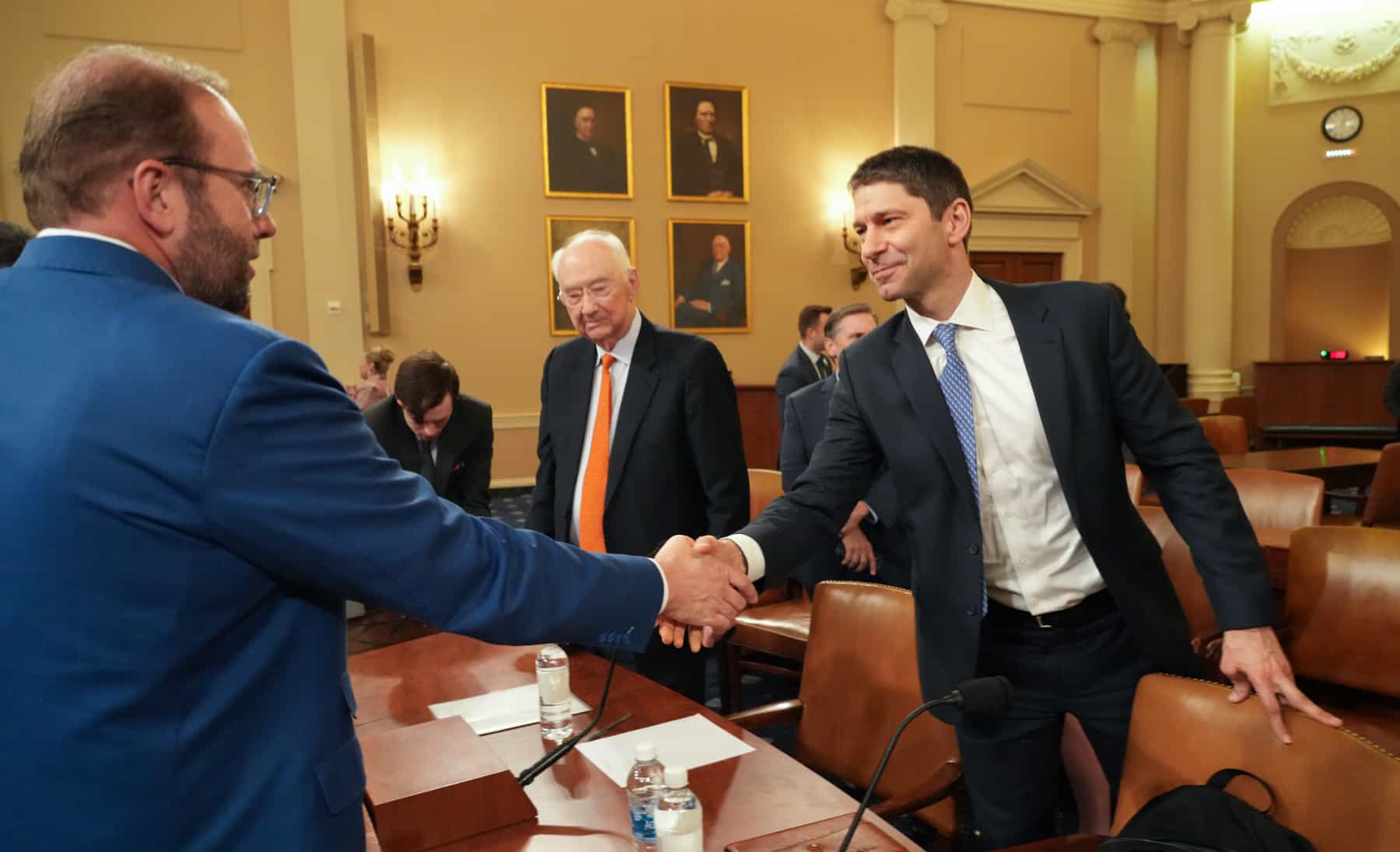
Austin Ramirez is living proof that the American dream still works—when the right policies are in place.
The president and CEO of family-owned Husco, a Waukesha, Wisconsin-based, hydraulic and electromechanical control systems manufacturer, told lawmakers Thursday that his family was able to found and expand a successful business in large part thanks to pro-growth tax policies.
All in the family: “My dad came to the states from Puerto Rico as a 6-year-old and grew up to earn a master’s in aerospace engineering and a Harvard M.B.A.,” Ramirez said at a hearing of the House Ways and Means Committee.
- “In short, our story is the embodiment of the American dream. But it was made possible by American reality—the laws that all of you write in this very room have a direct, concrete impact on our ability to succeed.”
Impact of expirations: The 2017 Tax Cuts and Jobs Act made it possible for manufacturers across the country to invest in new equipment, pay for renovations and expansions, hire much-needed workers and more. It was “unquestionably a success,” according to Ramirez.
- But the 2022 and 2023 expiration of three manufacturing-critical tax provisions in the legislation—immediate expensing for domestic research and development, enhanced interest deductibility and full expensing, which the NAM has been urging legislators to reinstate—has already hit Ramirez’s business, and hard.
- “Husco now has to amortize our R&D expenses, making it far more costly for us to design customized, proprietary products for our customers,” Ramirez went on. “Debt financing is now more expensive … [a]nd we can no longer immediately expense the full cost of our capital equipment purchases, forcing [us] to make smaller investments, spread out over many years.”
More tax increases coming: Ramirez also highlighted the TCJA provisions that are set to expire next year and the economic damage the expiration would cause.
- “At the end of 2025, individual tax rates will increase and individual tax brackets will decrease,” he said. “These changes mean that pass-through businesses like Husco will have more of our income subject to a higher rate of tax. At the same time, the pass-through deduction will expire completely, doubling down on the tax hikes that we face. … [A]llowing tax reform to sunset will undermine much of the progress we’ve made since 2017.”
What must happen: Ramirez thanked the committee for passing the Tax Relief for American Families and Workers Act—and reminded them of work still to be done.
- “Congress must act now to restore expired provisions—and be prepared to act in 2025 to forestall even more damaging tax increases. Only by preserving the Tax Cuts and Jobs Act can Congress ensure that uniquely America stories like Husco remain possible.”
Small Manufacturer: Industry Needs Tax Consistency
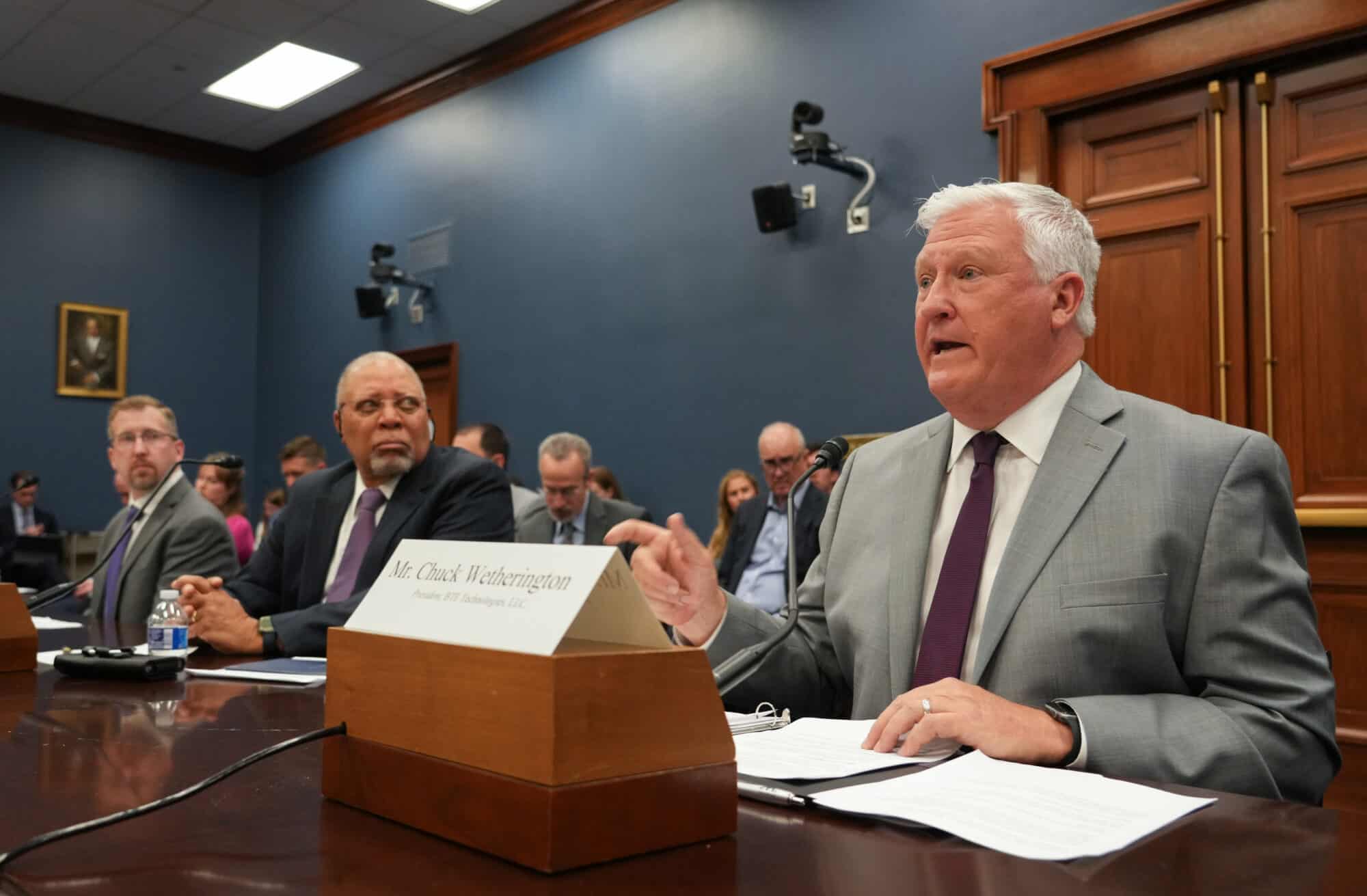
Small manufacturers need one thing from Congress, BTE Technologies President Chuck Wetherington told lawmakers on Wednesday: a consistent, pro-growth tax code.
What’s going on: Speaking at a hearing of the House Committee on Small Business, Wetherington told lawmakers how increased taxes and frequent changes to the tax code have harmed his company, a 40-employee medical device manufacturer in Hanover, Maryland.
- By passing the 2017 Tax Cuts and Jobs Act, “Congress was able to take a stale, outdated tax code and update key provisions to reduce taxes on small manufacturers,” Wetherington said. That legislation “drove a new wave of economic activity and industrial expansion. BTE, and many of our peers in the industry, experienced historic growth in the years between tax reform and the pandemic.”
- But the expiration in 2022 and 2023 of three crucial tax provisions—immediate expensing for domestic R&D, enhanced interest deductibility and full expensing, each of which the NAM is leading the charge to reinstate—is now hurting BTE and other businesses in its supply chain.
- And more tax hikes are on the horizon, with tax reform’s small business incentives—including the 20% pass-through deduction—set to expire at the end of 2025.
Less capital, fewer projects: “Bringing a medical device to market is extremely risky and takes years and millions of dollars of investment,” Wetherington continued. “But now, BTE cannot immediately expense those costs—reducing the working capital I have available to invest in my business and my employees … [and] delay[ing] projects to redesign and improve BTE’s flagship products.”
- As a direct result of the changes, BTE has had to put off expansions that would have allowed it to expand its workforce by 50%.
- And because most of BTE’s suppliers are pass-through businesses (entities in which profits pass through to the owner and are taxed at the individual rate), BTE will see even higher operating costs at the end of 2025, when tax rates are scheduled to increase and the pass-through deduction is set to expire.
What must be done—now: The Senate must pass the House-passed Tax Relief for American Families and Workers Act, which would reinstate the three expired provisions that are so critical to manufacturers. And Congress must commit to preventing the economic damage from the scheduled tax increases.
- “We deserve a tax code that promotes innovation and demonstrates to the rest of the world what our values will be for the next decade and beyond,” Wetherington said.
